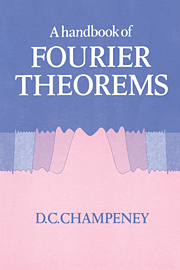Book contents
- Frontmatter
- Contents
- Preface
- 1 Introduction
- 2 Lebesgue integration
- 3 Some useful theorems
- 4 Convergence of sequences of functions
- 5 Local averages and convolution kernels
- 6 Some general remarks on Fourier transformation
- 7 Fourier theorems for good functions
- 8 Fourier theorems in Lp
- 9 Fourier theorems for functions outside Lp
- 10 Miscellaneous theorems
- 11 Power spectra and Wiener's theorems
- 12 Generalized functions
- 13 Fourier transformation of generalized functions I
- 14 Fourier transformation of generalized functions II
- 15 Fourier series
- 16 Generalized Fourier series
- Bibliography
- Index
12 - Generalized functions
Published online by Cambridge University Press: 05 June 2012
- Frontmatter
- Contents
- Preface
- 1 Introduction
- 2 Lebesgue integration
- 3 Some useful theorems
- 4 Convergence of sequences of functions
- 5 Local averages and convolution kernels
- 6 Some general remarks on Fourier transformation
- 7 Fourier theorems for good functions
- 8 Fourier theorems in Lp
- 9 Fourier theorems for functions outside Lp
- 10 Miscellaneous theorems
- 11 Power spectra and Wiener's theorems
- 12 Generalized functions
- 13 Fourier transformation of generalized functions I
- 14 Fourier transformation of generalized functions II
- 15 Fourier series
- 16 Generalized Fourier series
- Bibliography
- Index
Summary
Introduction
The Dirac delta function δ(x) is the best known of a class of entities called generalized functions. The generalized functions are important in Fourier theory because they allow any function in LLOC (and indeed any generalized function also) to be Fourier transformed. Thus the function f(x) = 1 has no Fourier transform within the realm of functions in LLOC, but it acquires the transform δ(y) in the generalized theory. The generalized functions thus remove a blockage which existed in the previous theory. There is an analogy with the way in which the use of complex numbers allows any quadratic equation to be solved, whilst within the realm only of real numbers not all quadratic equations have solutions.
Generalized functions remove many other blockings which occur in the analysis of functions in LLOC. For instance, every locally integrable function (and indeed every generalized function) can be regarded as the integral of some generalized function and thus becomes infinitely differentiate in this new sense. Many sequences of functions which do not converge in any accepted sense to a limit function in LLOC can be regarded as converging to a generalized function, and moreover in this case the sequence of Fourier transforms will necessarily converge to the Fourier transform of the limit. Thus, in many ways the use of generalized functions simplifies the rules of analysis.
- Type
- Chapter
- Information
- A Handbook of Fourier Theorems , pp. 118 - 134Publisher: Cambridge University PressPrint publication year: 1987



